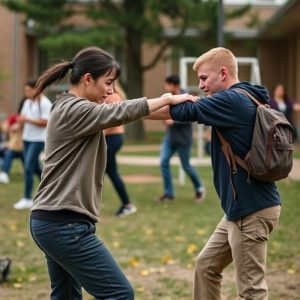Secure and Protect: A Student’s Guide to Personal Safety on Campus
College campuses are not just centers for academic pursuits but also places where personal safety is…….
College campuses are not just centers for academic pursuits but also places where personal safety is a significant concern. To address this, many institutions have implemented comprehensive self-defense programs tailored specifically for college students, ensuring they’re equipped with both physical defense skills and awareness training to navigate potentially hazardous situations effectively. These programs cover a wide range of topics including legal rights, situational awareness, risk assessment, and personal boundary setting, creating a holistic approach to personal security. In addition to self-defense workshops, colleges support students by providing access to emergency resources such as blue light phones, surveillance systems, safety applications, and night escorts, especially after dark. Campus security teams collaborate with local law enforcement for additional protection measures. Students are also encouraged to adopt daily safety habits like planning safe routes, traveling in groups, and utilizing campus security services. By combining proactive personal defense strategies with the available resources on campus, college students can significantly fortify their personal safety, fostering an environment that supports both academic success and personal growth. Self-defense for college students is thus a critical component of campus life, ensuring a safer educational experience.
navigating the transition from high school to college often involves adapting to newfound freedoms alongside heightened personal safety considerations. This article is a vital guide, outlining strategies and resources tailored for college students to maintain their safety on campus. From mastering self-defense techniques specific to their needs to strategically planning their living spaces, and leveraging university support systems, the insights provided will empower students to proactively approach personal safety with confidence. Embrace the opportunity to transform your college experience into a secure and enriching chapter of your life.
Understanding Personal Safety on College Campuses: A Comprehensive Overview for Students
College campuses are dynamic environments where students explore academic interests and personal growth. In this context, personal safety is a critical aspect that cannot be overlooked. For college students, especially those living on or near campus, self-defense skills are not just beneficial but essential for their well-being. Understanding personal safety encompasses a range of proactive measures beyond physical self-defense techniques. It includes being aware of one’s surroundings, understanding the resources available on campus, and maintaining open communication with roommates and friends.
Self-defense for college students extends beyond martial arts or combat training; it’s about cultivating a safety mindset. This involves knowing one’s legal rights, utilizing campus security services effectively, and employing practical safety apps that can alert authorities in case of emergencies. Students should also be educated on the importance of maintaining online privacy to protect against digital threats. Campuses increasingly provide workshops and classes specifically designed to empower students with the knowledge and skills needed to navigate their environments confidently and securely. By integrating these strategies into daily life, college students can significantly enhance their personal safety, fostering an environment where they can thrive both academically and personally.
Self-Defense Techniques Tailored for College Students: Empowering Yourself in Vulnerable Situations
College campuses are bustling with activity, offering a wealth of opportunities for personal and intellectual growth. However, the dynamic nature of campus life can sometimes create situations where students may feel vulnerable. Self-defense for college students is not just about physical techniques but also about fostering awareness, confidence, and a proactive approach to personal safety. Empowerment through self-defense training equips students with the skills to protect themselves in potentially dangerous scenarios.
Understanding the unique challenges faced by college students, self-defense programs tailored for this demographic often include strategies that are easy to learn and execute under stress. These programs typically cover basic striking techniques, such as punching and kicking, aimed at disorienting an attacker and creating an opportunity for escape. They also emphasize the importance of being aware of one’s surroundings, recognizing potential threats early on, and maintaining a loud voice to attract attention should the need arise. Additionally, these self-defense courses often incorporate verbal assertiveness training, teaching students how to confidently communicate boundaries and deter would-be aggressors. By integrating these practices into their daily lives, college students can significantly enhance their personal safety, fostering a sense of empowerment and resilience in the face of vulnerability.
Strategic Planning: Creating a Safe Environment in Your Student Dorm or Apartment
When it comes to ensuring personal safety for college students, especially those living in dormitories or apartments, strategic planning is key. One of the foundational elements of a safe environment is having a clear plan for self-defense. This involves not only understanding one’s legal rights but also knowing how to physically protect oneself. Students can start by attending self-defense workshops offered by many universities or local community centers. These workshops often teach practical techniques that can be employed in a variety of situations, from verbal de-escalation to physical maneuvers for escape and defense.
In addition to attending these workshops, creating a safe space within your living quarters is crucial. This includes maintaining well-lit common areas, installing deadbolts on doors, and using security chains for added protection. It’s also beneficial to keep windows locked and consider a peephole for visual confirmation of visitors before opening the door. Implementing safety protocols, such as having a buddy system when walking to and from your residence, can further enhance personal security. Additionally, investing in a quality personal alarm or a self-defense product like pepper spray can serve as deterrents against potential threats. By combining proactive measures with practical self-defense skills, college students can significantly reduce their risk of becoming victims of crime and foster a safer living environment.
Campus Resources and Support Systems: Utilizing University Services to Enhance Personal Safety
Colleges and universities recognize the importance of personal safety for their students, particularly as they navigate campus environments. A suite of resources and support systems is typically available to college students to enhance their safety, including self-defense training programs tailored specifically for them. These educational workshops empower students with practical skills and techniques that can deter potential threats or protect themselves if necessary. Beyond physical defense strategies, these programs often address situational awareness, risk assessment, and personal boundaries, providing a comprehensive approach to personal security.
Universities also offer a range of additional services to complement the self-defense training. Campus security departments are often equipped with state-of-the-art safety technology, such as emergency blue light phones and real-time monitoring systems. Safety apps and escort services are available to ensure students can travel safely across campus at night. Moreover, many institutions have established partnerships with local law enforcement to enhance the safety protocols on campus. These initiatives, combined with the proactive measures that students learn through self-defense training, create a robust support system that contributes significantly to the personal safety of college students.
Proactive Measures: Developing a Personal Safety Mindset and Training for College Life
Incorporating proactive personal safety measures is a cornerstone of a secure college experience. For college students, self-defense for college students isn’t just about physical techniques; it encompasses a comprehensive approach to situational awareness and personal safety mindset. This begins with education on recognizing potentially hazardous situations, understanding one’s rights and the resources available on campus, and practicing effective communication skills. Engaging in self-defense workshops tailored for college students can equip individuals with practical skills should they ever encounter a threat. These workshops often cover verbal assertiveness, personal boundaries, and physical self-defense maneuvers. Additionally, many universities offer courses or programs that focus on safety strategies, including self-defense for college students, as part of their orientation or ongoing student support services. Encouraging students to actively participate in these programs fosters a culture of empowerment and preparedness. By adopting this proactive stance, students not only enhance their own safety but also contribute to the overall security of their campus community.
Beyond formal training, cultivating a personal safety mindset involves daily habits that reinforce awareness and confidence. This includes planning routes to frequently visited locations, traveling with friends or in well-traveled areas, and staying vigilant during late-night activities. Utilizing campus security services, such as escort programs or emergency response systems, can also be an integral part of one’s personal safety plan. For college students, it is essential to stay informed about campus alerts and safety tips provided by the institution. By integrating these proactive measures into daily life, students can significantly reduce their vulnerability to unsafe situations. Self-defense for college students goes beyond physical techniques; it’s a holistic approach that encompasses mindset, education, and daily practices, ensuring a safer environment for learning and growth.


